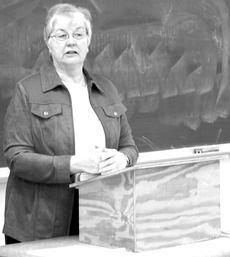The assistant dean of the College of Arts and Sciences will retire at the end of the semester after 32 years with the University. Anita Tully, who received her baccalaureate degree in English from Birmingham-Southern College and her Master of Arts degree, Ph.A. and Ph.D. from the University of Arkansas, joined the Nicholls faculty in the fall of 1978 as an assistant professor of English. It was her second higher education teaching position, having taught as the director of freshmen English at Louisiana College in Pineville three years prior.
“I think I’ve always referred to myself at Nicholls as a utility outfielder-somebody that does not have a specialty that I’ve perfected. I see myself as more versatile, someone who can teach a lot of different courses,” Tully said.
Tully said she has taught a range of courses in English, from freshmen English and sophomore literature to advanced grammar.
“I believe I majored in English because my favorite teachers were English, and when I sat in their classes, I saw an excitement, a love for the subject matter that I didn’t see in other classes,” Tully said. “Of course, it should be noted I have no talent whatsoever for math and science, so you could say it’s more of a default setting rather than a choice.”
But in the late 1980s and early 1990s, Tully switched departments and worked in general studies for five years, teaching humanities courses.
“That’s a very rewarding area to work in because everybody that comes through the door is unique and has a special cluster of needs and abilities,” Tully said. “So very often, we were spending time defining a life for those people, and that was a lot of fun.”
After working as a general studies professor, Tully returned to the Department of Languages and Literature as department head for eight years. Shortly after, she became assistant dean of the College of Arts and Sciences, a role she has held for about three years.
Tully has worked to create various programs during her time at Nicholls. One program, called the Senior Honors Incentive Program, brought high school seniors together at Terrebonne High School from surrounding schools to take an honors English class. The program lasted about four years.
“That lasted until the money ran out,” Tully said. “Programs have a life cycle that depends on funding, of course.”
Tully also helped create a travel study program called Literary Landscape in the 1980s, as part of a series of language arts seminars, which took local high school teachers to England. She called the program one of the highlights of her career, even though it is no longer offered due to staffing needs for other summer courses.
“We let them study Shakespeare in Stratford, go to plays in London and visit birth places of famous people, like John Keats.”
A few years later in the 1990s, Tully aided in starting the University Honors Program, which provides students of academic excellence with an enhanced scholastic experience.
“That [program] is one of the best things that ever hit Nicholls,” Tully said. “That is an outstanding program that pays airfare, tuition, dormitory, everything except whatever it takes for food and recreation. And [honors students] get three weeks in England.”
Tully has been the recipient of the Marie Fletcher Service Award, given by the Alumni Association, as well as numerous plaques and awards for the Nicholls State-Youth Opportunities Unlimited, or NS-YOU, summer dropout prevention program, which was created to address the dropout problem among students from low-income families.
Despite these accomplishments, Tully said she thinks of herself more as a teacher than a scholar. Although the benefits of teaching oftentimes are not instantaneous, they are rewarding in the end, Tully said.
“The rewards of being a teacher are not measureable from the outside. I wish I could see the light bulb go over a student’s head when an idea has just caught fire,” Tully said. “But the rewards come later, when students get in touch with me and say, ‘you may not remember me, but what you told me helped me make a decision that changed my life.’ “
Tully said when she first came to Nicholls, she had not planned on staying at the University for the long-term. But it was Nicholls’ students who inspired her to continue learning and to stay at the University for more than three decades.
“The first seven or eight years of my career here, I always said it would be my last year because naturally, you’re encouraged to move on, but after being here, I realized there was something unique about the students,” Tully said. “It’s not only that they were unfailingly polite, but they were so appreciative.”
Although her love for teaching has not faded, Tully said her lack of enthusiasm for her ancillary duties, such as working on committees, is one of the things that has prompted her to retire.
“I can’t spread myself as thin as I used to.”
Tully also said educators today are losing their morale due to economic strains.
“If we come up with great ideas, we’re not going to see the fruition,” Tully said. “The thing that’s going to define Nicholls in the future is going to be money. We don’t have enough money to be creative.”
After retirement, Tully hopes to reknit ties with her family, continue writing and travel-the one thing she said is most important to her after family and education. Among the places she wants to travel are Vancouver and Italy.
“I’ve been to Italy twice,” Tully said, “and if I had to get lost in an airport and not be able to go home, I hope it’s in Italy.








